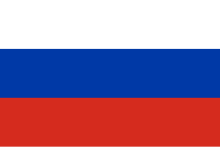
Russian nationalism (Russian: Русский национализм) is a form of nationalism that promotes Russian cultural identity and unity. Russian nationalism first rose to prominence as a Pan-Slavic enterprise during the 19th century Russian Empire, and was repressed during the early Bolshevik rule. Russian nationalism was briefly revived through the policies of Joseph Stalin during and after the Second World War, which shared many resemblances with the worldview of early Eurasianist ideologues.[1]
The definition of Russian national identity within Russian nationalism has been characterized in different ways. One characterisation, based on ethnicity, asserts that the Russian nation is constituted by ethnic Russians, while another, the All-Russian nation, which developed in the Russian Empire, views Russians as having three sub-national groups within it, including Great Russians (those commonly identified as ethnic Russians today), Little Russians (Ukrainians), and White Russians (Belarusians). Russian nationalists have identified Russia as the main successor of the Kievan Rus' and typically view the arising of separate national identities of Belarusians and Ukrainians as having broken away from Russian national identity. In the Eurasianist perspective, Russia is distinctive civilization separate from both Europe and Asia, and includes ethnic non-Russians of Turkic and Asiatic cultures.
- ^ Nugraha, Aryanta (February 2018). "Neo-Eurasianism in Russian Foreign Policy: Echoes from the Past or Compromise with the Future?". Jurnal Global & Strategis. 9 (1): 99–100. doi:10.20473/jgs.9.1.2015.95-110. Archived from the original on 2023-07-06 – via Global Strategis.